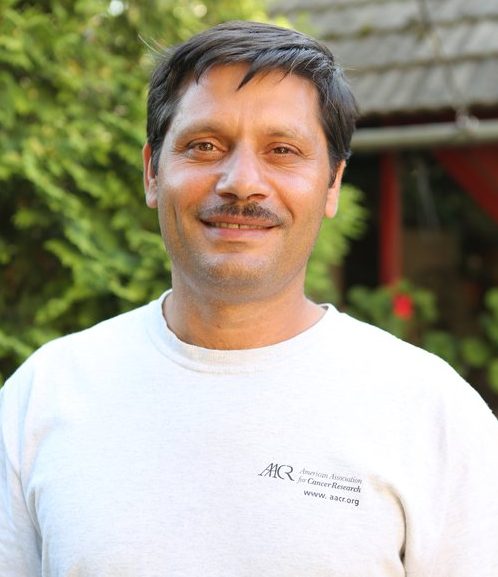 “One day, I came to the point when I praised God for having made me an orphan.” We were taken aback by his words, but Ruslan seemed calm and sure about what he had just said.
“One day, I came to the point when I praised God for having made me an orphan.” We were taken aback by his words, but Ruslan seemed calm and sure about what he had just said.
With a slight smile on his lips and his eyes focused on the cup he was holding, it was as if he was watching scenes of his life in the sparkling tea.
Somehow we got the sense he wasn’t just merely thanking God for whatever happens, but was a prelude to a much greater story.
Ruslan Surmay, is a 47-year old Gypsy pastor, father and grandfather. He is one of the very few people in Ukraine who preach the Gospel to those considered thieves, beggars and cheats in society. He is also the first translator of the Bible into the Gypsy language.
His wife Irina was sitting next to him in the tiny kitchen of their house, adjoined to a small village church-building for approximately 60-70 people.
Despite its size, the house stood out dramatically, compared to typical Gypsy shacks in the village of Perechyn, nestled at the base of the Carpathian Mountains of Ukraine.
“We moved to this house about eight years ago when HART blessed us with this building,” Irina said.
“Before that, we lived in a traditional Gypsy hut that we built ourselves. We made hundreds of clay and straw bricks, and let them dry for a few weeks before constructing the walls. Nobody helped us. Everyone had their own bitter lives…”
GYPSY LIFE
Perechyn is a multi-ethnic town of Ukrainians, Hungarians (it was once part of Hungary) and Gypsies, who live in a small community on the outskirts of the village. They represent
a completely different picture and lifestyle than the rest of Perechyn.
Here you find yourself in slums, mud and crowds of half-naked kids, playing with sticks, torn tires and home-made primitive toys.
They swarm around you, as soon as you enter their world, creating a feeling that the whole community has far more kids than adults. And it’s true, as most families have six, ten or more children.
Their homes are primitive shacks, built with handmade clay brick walls and a well ‘ventilated’ roof above.
There are no fridges or indoor stoves, nor washrooms or kitchens in these dwellings. Cooking takes place outside.
Well-built, comfortable houses are not common in Gypsy villages.
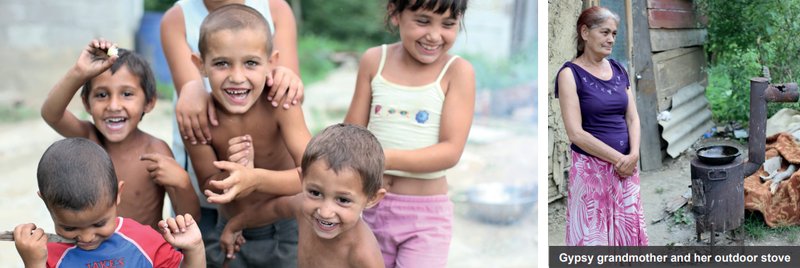
STRANGERS FROM EGYPT
Historically, Gypsies were nomadic tribes from India who migrated to the Middle East, eventually into Egypt, and then reached Europe.
“How did we end up being beggars, thieves and vagrants?”
Ruslan brought up this troublesome issue while giving us a tour around the village.
“The legend says that our people were famous for their creative and artistic nature. Singers and dancers, not eager to work hard though, therefore were despised and rejected in society.
Moreover, these Indian tribes had learned some magic while travelling through Egypt. The name “Gypsy” means “those, who came from Egypt.”
However, back then in Catholic Europe, such knowledge about magic was not an advantage. Eventually, these suspicious strangers didn’t get official permission to work in Europe, so they were left with no other option but to beg and steal.”
THE LEAST OF THESE
We were immersed in typical Gypsy life as we strolled along the winding trails between homes in these slums.
A young mother sat on the ground breast-feeding her newborn; old ladies wore bright colorful clothing while cooking on outdoor fires; tanned and wrinkled men curiously looked out of their glassless windows; and dirtcovered little boys were trying to make a rusted bike with flat-tires move down the muddy path.
Years earlier, Ruslan and Irina had started life as a typical Gypsy couple. They were married at the age of 14, which is considered a ‘normal’ marriage age among Gypsies.
Their marriage ceremonies are nothing formal – more like a verbal agreement between families, a “shaking hand” ritual, without even government registration or a church ceremony.
Ruslan and Irina met at an orphanage, both having no parents and, despite big families and numerous relatives, had no one to take care of them.
“We came to Perechyn after graduating from vocational schools with the only possession we had – our first son Gopal.” Irina continued, “At first, we lived with Ruslan’s brother. But he wasn’t very welcoming. He eventually evicted us, and we tasted the life of being homeless.”
There were times, when this young family spent nights at the railway station trying to keep warm when it was -30⁰C.
Work was scarce in Perechyn. Gypsy women and kids traditionally would beg, while men wove baskets or brooms or sold items they found in garbage dumps. Ruslan and Irina followed the pattern.
“Could you ever imagine a dirty, poor Gypsy man, who sneaks onto trains, begs for bread and spare change, sleeps on the ground and drowns his despair in alcohol – as a future Christian pastor!?” Ruslan asked.
“But that’s exactly how God saw me!”

WHY HAD GOD CHOSEN ME?
“Get up, Ruslan! Christians are in the village!” A neighbour cried out at the door of their shack. This was during the tough post-Soviet 90’s in Ukraine, which was especially difficult for the Gypsies.
Christian missionaries were seen as a source of food and second hand clothing. They had heard some Germans were distributing snacks and clothes, so now it was an opportunity
too promising to miss. “Go and grab anything you can there for us and our kids,” Irina implored her husband.
Ruslan dressed up hurriedly and headed to a house where the outreach was going on. “To this day, I cannot comprehend how the whole village fit into that tiny place!” He smiled. “When I arrived, people were in the middle of a repentance prayer. Dozens of them, crying, praying and no more seeking food and clothing, but forgiveness and salvation…”
“I gave my heart to Jesus at the next service that took place in my sister’s house. Was it easy transformation?
Did we all instantly become saints? No…far from it. There were times when all of us men pretended to be listening to the preacher while being completely drunk and dreaming only about good food and sleep.
But the ministers were patient to us. And especially to me.” One Christian brother from a nearby city came to Perechyn every week to study the Bible with Ruslan.
Through rain or snow, day or night, he was there to prepare him for the ministry.
The missionaries continued their outreach to the Gypsies, but realized they needed locals to take over.
“Why did they choose me? Was I that special? Was I the best Christian in the village, an example of a good and righteous life? No…” explained Ruslan, “but I was simply the only man in the village who knew how to read and write and therefore, was able to study the Bible. And this unique skill (to Gypsies) was given to me by the orphanage I grew up in.”
The illiteracy rate among Gypsies can reach 98%. The reasons for this are varied: school supplies are expensive;
Government teachers don’t care about Gypsy kids; and its humiliating for them to be the poorest kids in the class. Consequently, most Gypsy parents don’t even encourage kids to attend school.
Since school is not a real alternative for them, young kids are forced into begging or looking after numerous younger siblings. Then at the age of 13-14 they quickly enter adulthood – begin their own families, raise children and try to make ends meet.
By middle-age, they are worn out old people. As a result, their life expectancy barely reaches 55 years. Options to escape this vicious cycle of poverty are few.
“Now I realize,” Ruslan continued, “that God had chosen me, before I even knew Him to be a provider of His light to my people.
My dad had twelve children with my mother and twelve more from another woman. I was always curious, why God had taken away our parents and left twentyfour kids orphans?
One evening, during a Bible study the answer struck me. Even though, now our church in Perechyn is only 17 years old, God started His work in this village 43 years ago, when a frightened crying little boy was dropped off at an orphanage but eventually learned how to read and write.
The Lord turned a tragic story of a child who lost both parents, into the transformation of a whole community.”
AND THEN GOD SENT US A PHONE
Irina also felt God’s love by seeing her husband change. She wasn’t touched by wordy sermons, however her heart opened to a miracle of repentance and forgiveness. “As Ruslan was reading the Bible, he turned into a new man,” she said. “He quit drinking and smoking. And after a while, he felt God’s calling to service”.
However, begging and trying to make some money to support the family didn’t leave Ruslan with much time for ministry.
“All my thoughts were about how to make some money, as we did not have permanent income. Once I said to God: if You want me to serve You, give me a job and provide for us, so that my kids would not be hungry and I would have time to study Your Word”. And God answered the prayers by sending them….a mobile phone.
Gopal, Ruslan’s son, found it. Since nobody in the village had phones, and the family really didn’t need one either, they decided to sell it. “We saw, how God cared for us through this mobile phone,” Ruslan said. “With the money we made on it, I went to a nearby city where there was a wholesale market and bought some clothing.
This is how we started our small business. I travelled to the market to buy products and Irina was selling them here in Perechyn. We didn’t make much money.
Just a minimum actually, however, we never had to go back to begging again. God was good.”

HART COMES INTO THE PICTURE
In a short while, Ruslan gained the respect not only among his fellow villagers, who trusted him more than their Gypsy King (head of the village), but also among Perechyn town authorities and Ukrainians. Single handedly he managed to clean up the reputation of the Perechyn Gypsies, as many of them became Christians and didn’t go back to stealing.
“Although, we didn’t starve,” Ruslan remembers, “work was taking all my time. We had six children, so whatever I erned went to feed and dress them. My ministry was starting to suffer. That’s exactly when HART entered our lives.”
HART’s ministry Team in Ukraine had heard about a unique Gypsy pastor who was able to read and write, who studies the Bible and leads a church in a village.
At the time, HART was helping a Gypsy ministry in a neighboring village.
“We were blessed to meet our brothers from HART,” Ruslan says. “You know, we didn’t lack ideas and vision.
I would have been continuing my ministry with or without HART,” he smiled at his own frankness.
“But it is always good to know that you have somebody to rely on. Someone to pray for you and extend a helpful hand when you fall and are in need.
There were times, when I was broken, lost hope and fell into despair, but I knew that I had support and people were praying for me. This strengthened and encouraged me to keep on serving the Lord.”
“Moreover, HART enabled us to bring the vision we had in our hearts into life, and transform this community into a living example of God’s saving power and love to ‘the least of these.’
Before HART came to partner with us, we were not able to run summer camps, or give Christmas gifts to the kids. Gypsies, as all the poor, love to see some material fruit of the ministry. When I was only starting my ministry as a pastor, one man said to me, ‘How can you help the village, when you are barely able to take care of your family?’ He was right. So HART was God’s answer to this need.”

TRANSFORMATION IS TAKING PLACE
As we continued our walk through Perechyn, Ruslan suddenly interrupted a story he was telling us – to point something out. “You see those cloth lines stretched between the shacks?” he pointed at the motley clothes labyrinth that webbed through the whole village. “It is not just washed clothes drying in the sun, it is a new face of the village and an evidence of God’s miracle.”
All Gypsy women – old, sick or pregnant, needed walk 1-3 kilometres a day to the nearest well or river and return with full heavy buckets. Pastor Ruslan had the vision to restore an old soviet water reservoir which was situated on the top of a hill overlooking the village.
With HART’s help, they refurbished it, and installed plastic water piping to all the homes in the village. As a result of this project, Gypsies were now able to wash clothes on a regular basis, and keep their children cleaner.
At the first glance, Perechyn today is a still a typical Gypsy camp with people living in extreme poverty. But a closer look reveals how this community is being transformed.
About 70% of the Gypsies attend Ruslan’s church.
They’ve quit drinking and stealing. HART helped build outdoor washrooms in the village. That together with a good water supply results in better hygiene, which is responsible for reducing illnesses typically plaguing people living in abject poverty.
HART also helped to start a school in the village where Irina teaches kids how to read and write. She even teaches adults and leads Bible classes with them.
But not only Perechyn has a Church School today.
Ruslan was inspired to start schools in other communities.
Together with HART’s support he initiated seven more church schools in other gypsy villages.
Even Ruslan & Irina’s daughter has set a revolutionary new example for her peers. Firstly, because she not only learned to read and write, she also elected to go to a vocational training school and learn a skill.
And even more remarkable for Gypsies was the fact that she waited until she was 20 to get married. She had a classic Christian wedding ceremony and wore a snowwhite dress. Her message to the girls in her village: get an education, marry when you are mature, and a wedding is something special in God’s eyes.
Ruslan, for his part, is working on the very first translation of the New Testament into Gypsy language.
“They need God to speak right to their hearts,” he says, “with no barriers, with no mediators.”
HART has provided micro-finance loans to help Gypsy villages like Ruslan’s plant potatoes and other produce.
Now they know how to provide for their families, sell excess produce and save potatoes for next year’s planting.
HART arranges for mobile medical-dental buses to visit these villages, providing medical and dental care to hundreds of Gypsy families each year.
Step by step, the Gypsies are breaking free of the cycle of poverty – with every child that learns to read, with every disease that is prevented because of clean drinking water, with every crop of vegetables they plant, grow and harvest, and with every Word of God they hear.
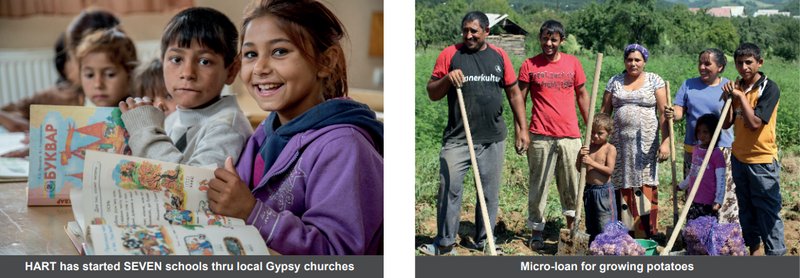
A VILLAGE WITH TWO LEADERS
As we rounded a corner and walked towards Ruslan’s home, we couldn’t help but notice an extraordinary house just up the street from Ruslan’s. It was by far the largest and most luxurious house in the village.
“That is our baron’s house,” Irina explained. “A cruel rich man, who enslaves the villagers. It is common for all Gypsy communities to have a Gypsy Baron (King).
“He is a local mafia guy, who controls everyone in the village. He makes a fortune by giving out loans, charging extremely high interest rates that villagers are not able to repay.
For example, a sick child needs an operation and of course the father doesn’t have the funds. His only option is to borrow money from the Gypsy King. The interest rates are so high, it’s impossible to repay the money and the father now remains in debt to the Gypsy King forever. It is a horrible, cruel racket.”
Several kids ran up to Ruslan laughing loudly and he kindly ruffled their coal-black hair. “In the past, people used to go to baron for help first,” he smiled humbly.
“However, today, whatever happens, they now come to me first.”
As you approach the Gypsy village of Perechyn, this is the picture that welcomes you. Two houses – two leaders. One imposing slavery and subordination, another – preaching freedom in Christ and salvation. One – keeping people in a prison of constant debt, fear, illiteracy and poverty, another – leading them to light.
God raises his leaders from the least of those, from beggars and orphans to be an alternative to this world’s leaders. As a Moses to his people, Ruslan was chosen by God before he even knew Him, to break the vicious cycle of slavery, poverty and despair.
Ruslan’s story proves that the Lord equips the chosen and puts words in their mouth, and giving them a staff to do His wonders.
“I praise God for having made me an orphan… but then finding me, calling me son and giving me a whole new family of HART ministry and Gypsy believers.”
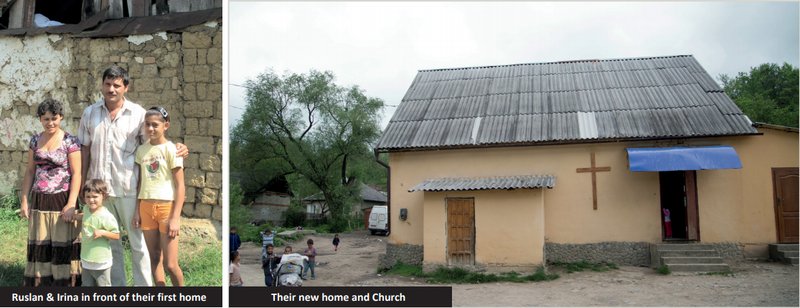
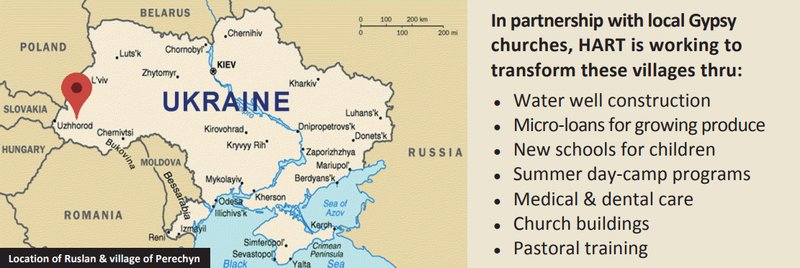
All of the work that HART accomplishes in the Gypsy communities of Ukraine is because of generous people like YOU in Canada and the USA.
Thanks to all of you who are prayerfully and financially supporting these ministries.

